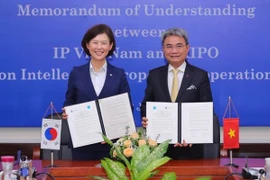The IPO market in Vietnam had been frozen during the past four years after therobust period of 2017-19, which saw IPOs of big names such as Petrolimex (PLX),Vinhomes (VHM), Vincom Retail (VRE), Techcombank (TCB), VPBank (VPB), Binh Son Refiningand Petrochemical Joint Stock Company (BSR) and PV Power (POW).
A report by Deloitte Vietnam earlier this year showed that there were onlyeight successful IPOs in Vietnam in 2022 which raised a total of 71 billion USD,compared to 42 IPOs in Thailand which raised 3.6 billion USD and 59 inIndonesia with 2.3 billion USD raised.
Since the COVID-19 pandemic, there were new options coming from the switchingof listings to HCM City Stock Exchange (HOSE) such as Duc Giang Chemicals(DGC), Vietnam Rubber Corporation (GVR), Becamex (IJC), Viettel Construction(CTR). However, the stocks with low liquidity of free-float were not tastes offoreign investors.
Different from the robust period in 2018, the recent IPOs were not attractiveto cash inflow with many stocks tumbling significantly after IPOs.
One of the reasons for the frozen IPO market was the stagnant equitisation ofseveral State-owned enterprises (SOEs) including Agribank, VNPT, MobiFone,Vinataba, Vinachem and HUD which still had no specific date for completion.
The problems in asset valuation caused the IPO of SOEs to be stuck, creating abottleneck in attracting foreign indirect investment (FII) flows in Vietnam, NguyenDuy Linh, general director of VPBank Securities said.
With estimates that the US Federal Reserve was likely to make significant ratecuts next year, beginning earlier than previously forecasted, together with therecovery of emerging economies, the FII would be more selective towards marketswith stories for investment. Vietnam would be a destination, Linh said.
“The upgradation of the market status plays an important role,” Linh said,adding that the Government should strengthen IPOs, capital divestment at SOEsas well as upgrading the stock market status in 2024-25 to attract FII.
He said that FII inflow depended on the quality of economic growth, stocks, themarket transparency and enterprises themselves meeting criteria for investment.“There are opportunities even in the most difficult time,” Linh said.
According to Chairman of Dragon Capital Vietnam Dominic Scriven, the stockmarket should not rely too much on the IPOs of SOEs alone. He said the solutionshould be promoting the listings of private enterprises. “The diversity ofstocks will help attract foreign capital,” he said.
The lack of diversity of stocks made it difficult for investors and funds todevelop their portfolios because currently banking and real estate stocksaccount for the majority of the Vietnam’s stock market.
For example, Pyn Elite Fund spent more than half of their net asset value,estimated at around 800 million USD, in banking stocks. The 1.6 billion USD VEILunder Dragon Capital also held 60% of their net asset value in banking and realestate stocks.
Banking stocks were too dominant. Statistics shows that banks account fornearly 40% of the capitalisation on HCM City Stock Exchange, in whichVietcombank (VCB) and BIDV (BID) alone make up for 15%. There are 14 bankingstocks in the VN30 basket. Sixteen out of 41 companies with a marketcapitalisation from 1 billion USD were banks.
New market entrants would be important if Vietnam wanted to take advantage ofthe foreign cash inflow when the market status was updated, he said.
“When the bottlenecks in the IPOs of SOEs cannot be solved immediately, theexpectation should be on the private sector,” he said.
Many private companies planned to IPO worth billions of US dollar in the lasttwo years, including Hung Thinh Land, CP Vietnam, VSIP, Giao Hang Tiet Kiem, BachHoa Xanh and Thaco.
Vietnam is currently classified as a “frontier market” by global ratingsorganisations FTSE Russell and MSCI.
FTSE Russell’s September 2023 ranking report placed Vietnam on a watch list forpossible reclassification to secondary emerging market status./.





























